Whether you’re decorating your new home, planning a baby shower, or just curious about cultural quirks — Chinese superstitions have a way of popping up in conversations more than you might think.
These beliefs are deeply woven into everyday life for many Chinese families, and understanding them is a great way to gain insight into one of the world’s oldest cultures.
Plus, if you’re ever traveling to China, celebrating Chinese New Year with friends, or marrying into a Chinese family, you’ll want to know which traditions bring luck — and which ones you might want to avoid.
In this post, we’ll explore the origins of Chinese superstitions, common beliefs, and how they shape modern life. We’ll also share a few useful Amazon finds if you’re into bringing good vibes into your own space or celebrating the traditions yourself.
What Are Chinese Superstitions?
Chinese superstitions are traditional beliefs passed down over centuries — many rooted in Confucianism, Taoism, Buddhism, and even ancient folklore.
These aren’t just old tales your grandma might tell; they influence real decisions today. People might delay a wedding date because of the lunar calendar, avoid certain house numbers, or decorate their homes based on Feng Shui principles.
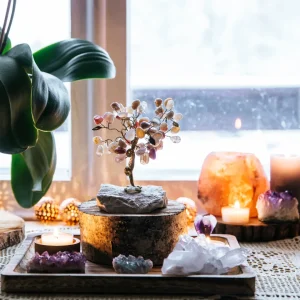
Numbers, colors, dates, and symbols all have meanings. For example, red is the color of prosperity, while white is often associated with mourning. Numbers like 8 are celebrated (it sounds like “wealth” in Mandarin), while 4 is often avoided (it sounds like “death”).
Understanding these cultural codes can help you avoid accidental faux pas — and maybe even win some bonus points with your Chinese friends or in-laws.
10 Common Chinese Superstitions
Here are some of the most widely known Chinese superstitions that still show up in daily life, along with the fascinating reasons behind them:
- Avoid the Number 4
The pronunciation of “four” in Mandarin and Cantonese sounds very similar to the word for “death.”
So, it’s often skipped in old buildings (you might see floor 3, then 5) and avoided in phone numbers or license plates.
A Chinese friend of mine wouldn’t rent an apartment on the 4th floor even though it was cheaper. They said it just didn’t feel right.
But here’s a fun twist: While the number 4 is feared, its tongue-twisting cousin — “sì shì sì, shí shì shí” (四是四,十是十, “four is four, ten is ten“) — is a beloved Mandarin tongue twister for mastering pronunciation.
- Don’t Give Clocks as Gifts
Giving a clock is like counting down someone’s final moments. In Chinese, the phrase for “giving a clock” is “送钟” (sòng zhōng), which sounds identical to “送终” (sòng zhōng), a term meaning to attend to someone in their final moments or to send someone off in death.
Because of this unsettling association, gifting a clock can feel like an omen or a farewell to life itself.
- Never Stick Chopsticks Upright in a Bowl of Rice
This resembles incense sticks used in funeral rituals, which are typically placed in bowls of rice as offerings to the deceased.
That visual parallel makes the gesture feel like invoking the presence of spirits or honoring someone who has passed.
In restaurants, you’ll sometimes see foreigners do this without knowing — maybe just setting down their chopsticks for a moment — but to Chinese diners, it looks unsettling and disrespectful, especially during a festive or casual meal.
- Sweep the House Before the New Year but Not on the First Day
Sweeping before New Year’s Eve clears away bad luck from the past year. In the days leading up to Chinese New Year’s Eve, everyone is busy — cleaning the house from top to bottom, shopping for fresh groceries, buying new clothes, getting haircuts, and even decorating with red banners and lanterns.
It’s a full-on makeover for the home and family, all in the name of making things fresh and lucky for the year ahead.
Chinese people are very serious about this. The cleaning isn’t just about tidiness; it’s about sweeping out the misfortunes of the old year to make space for the good luck of the new one.
But doing it on New Year’s Day is believed to sweep away your fresh good fortune. One Chinese auntie I know actually hides the broom to avoid temptation.
- Avoid Washing Hair or Laundry on New Year’s Day — Protect Your Prosperity
This deeply-rooted superstition connects the Chinese word for “hair” (发, fà) with “wealth” (发财, fācái) — washing either your hair or clothes on New Year’s Day is believed to literally rinse away your good fortune for the coming year.
The logic extends further: water represents the flow of money in Chinese culture, so letting it drain away while cleaning symbolizes financial loss.
Many families prepare by washing hair the night before and completing all laundry days in advance, with some even covering their washing machines with red cloths as a symbolic barrier against bad luck.
This tradition persists because it creates a psychological sense of preserving abundance — as the saying goes, “Why would you pour your prosperity down the drain on the most important day of the year?”
- Pregnant Women Shouldn’t Attend Funerals
In traditional Chinese culture, pregnancy is considered a vulnerable and spiritually sensitive period.
Attending a funeral, which is surrounded by strong yin (death-related) energy, is believed to potentially harm the unborn baby or bring bad luck to the pregnancy.
It’s not uncommon for families to firmly advise expecting mothers to stay away, even if the funeral is for a close family member.
The concern is not just emotional — it’s deeply rooted in a belief that the opposing forces of life (birth) and death should not mix.
Some families will even go so far as to ask pregnant women not to visit the home of someone who has recently passed away, as a precaution to protect the mother and child.
This practice might feel restrictive, but it’s all about safeguarding the wellbeing of the next generation.
- Don’t Flip Fish During Meals
In many southern Chinese regions, especially in coastal areas like Guangdong and Fujian, there’s a strong belief that flipping a whole fish at the dinner table brings bad luck.
The superstition is particularly significant for families with fishermen, as flipping a fish is said to symbolize a boat capsizing — a serious omen of danger or loss at sea.
To avoid this, diners are taught to eat the top side of the fish first, then carefully remove the bones to get to the underside, without ever turning it over.
This is especially important during Lunar New Year meals, when fish (which symbolizes surplus and abundance) is always served whole.
In some places, instead of flipping the fish, someone will say, “Turn the boat” and rotate the plate entirely — keeping the fish intact while still sharing both sides.
- Pointing at the Moon Can Bring Bad Luck to Your Ears
This superstition is something many Chinese children grow up hearing — never point at the moon, or your ears might swell, crack, or get cut.
While it sounds like a spooky bedtime warning, the origin of this belief is rooted in deep respect for nature and celestial bodies.
In ancient folklore, the moon is sacred and closely tied to deities like Chang’e, the Moon Goddess.
Pointing at it is seen as disrespectful, and the warning about your ears is meant to discourage irreverent behavior. Even today, some adults may gently remind kids not to do it during nighttime walks, just in case. It’s one of those little things that stick with you, even if you no longer believe it literally.
- Whistling at Night Can Attract Ghosts
This is one of the creepier superstitions, and it’s shared across multiple East Asian cultures. In Chinese folklore, nighttime is when the spiritual world becomes more active.
It’s a time of stillness and yin energy, which is associated with darkness, quiet, and spirits.
Whistling at night is thought to break that stillness and act like a beacon — calling attention not just to yourself, but to any wandering spirits nearby.
The idea is that the sound of whistling can mimic spiritual summoning or signal an invitation, even if unintended.
Parents often tell kids not to whistle after dark, especially in rural or older neighborhoods, where ghost stories are more common. And honestly, it sticks with you.
I still remember when I was a kid, hanging out with friends in our neighborhood community — we’d play games, tell ghost stories, and try to act brave. But the truth? I was the most easily spooked one in the group. On my way home, I’d be too scared to take the stairs alone. If I heard any weird sound — especially someone whistling — I’d freeze. It was like my brain instantly went into horror-movie mode.
Whether you believe in spirits or not, these stories get under your skin and make you second-guess making noise in the dark. So yeah… maybe don’t whistle at night. Just in case.
- Use Red Envelopes for Gifting Money
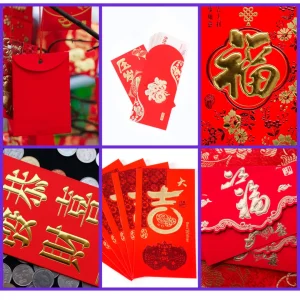
Known as “hongbao,” these red envelopes are a must-have during holidays and special celebrations like weddings, birthdays, and especially Chinese New Year.
The color red is all about luck, protection, and joy — it’s meant to send good vibes along with the money inside.
When I was a kid, one of the most exciting things about Chinese New Year wasn’t just the feast of delicious dishes — it was the red envelopes from relatives. I’d eagerly count how many I got and dream about what I could spend the money on: maybe a new toy, a trip to the bookstore, or saving up for something big.
Every kid I knew had their own plan. It made us feel grown-up in the best way.
If you’ve never given or received a red envelope before, trust me — it’s not just about the money. It’s a moment of joy and connection.
Red envelopes make the gesture festive, thoughtful, and culturally appropriate. You can grab beautifully designed red envelopes on Amazon — they come in all styles, from traditional gold-lettered ones to modern floral prints, so you’re always ready to give with good energy.
Chinese Superstitions About Luck
Lucky Numbers
Certain numbers are considered highly auspicious, like 8. While the pronunciation of 8 (bā) isn’t identical to “fa” (发), which means “to prosper,” the two are close enough in sound that people associate the number with wealth and success.
That’s why license plates, phone numbers, or addresses with multiple eights are especially desirable — people are essentially stacking their fortune.
Another lucky number is 6 (liù), associated with smoothness and success, as the phrase “liùliù dàshùn” (六六大顺) means “everything goes smoothly.” It’s the number of flow, ease, and momentum. You’ll often see businesses using 666 in advertisements to suggest everything is going perfectly.
On the flip side, 4 is usually avoided because it sounds like “death”. This fear of 4 extends to hospital rooms, car plates, and even phone numbers. So if you’re ever choosing a number in China — whether it’s a birthday gift amount, a phone number, or a new apartment — you’ll definitely want to go heavy on the eights and sixes, and skip the fours if you can.
Power of Red and Other Lucky Colors
Colors also play a huge role, especially red. Red is the ultimate symbol of prosperity, energy, and protection.
That’s why during big life moments — weddings, birthdays, New Year celebrations — people wear red, decorate with red, and even give red items.
You’ll see red couplets on doors, red lanterns hanging outside, and even red underwear! Yep, wearing red underwear (often gifted by family) is believed to shield you from bad luck, especially in your zodiac year. Red socks and red accessories are also popular gifts during this time.
But red isn’t the only lucky color. Gold and yellow are also considered very auspicious because they symbolize wealth, royalty, and power — think ancient emperors dressed in golden robes.
Symbolic Characters and Wordplay
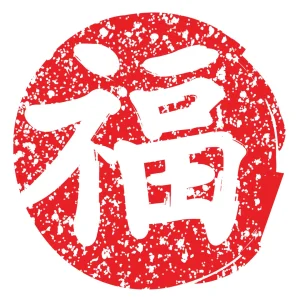
Even the Chinese character “fu” (福, which means “fortune”) is commonly printed upside down on decorations during the New Year.
People hang the Chinese character “福” (fú, meaning “fortune”) upside down for a special reason. In Chinese, the word for “upside down” (倒, dào) sounds like “arrive” (到, dào).
So when you flip the “fu” character, it creates a wordplay meaning “good luck has arrived!” Don’t be surprised if you visit a Chinese friend’s home during the New Year and see the upside-down “fu” displayed proudly on their front door — it’s their way of saying, “Come on in, and bring the good fortune with you.” Red is considered a lucky color in Chinese culture, making this tradition double the good fortune!
Auspicious Timing
Timing matters too. Auspicious dates for weddings, business openings, and house moves are often chosen according to the lunar calendar, which is believed to align with natural rhythms and spiritual energy.
Many families consult the Chinese almanac — often called the “Huang Li” — to pick a lucky day that suits both the type of event and the individuals involved. These calendars break down daily dos and don’ts, with symbols and characters indicating which days are good for things like travel, signing contracts, or starting construction.
Sometimes, families will even hire a Feng Shui master or a traditional expert to select a personalized “huangdào jí rì” (黄道吉日), which means an auspicious date. This is especially common for big events like weddings, business openings, or even moving house.
It’s not unusual for people to consult these professionals months in advance, providing details like names, birthdates, zodiac signs, and even the type of event — all so the master can calculate the most harmonious time and date. You’ll be surprised how much money some families are willing to spend on this — we’re talking hundreds to even thousands of dollars.
But in their eyes, it’s totally worth it. This isn’t just picking a day off the calendar — it’s like laying the foundation for a smooth, prosperous future. And in many families, choosing the date is taken just as seriously as picking the wedding dress or the house itself!
Choosing a date isn’t just superstition for many; it’s a thoughtful ritual. For instance, a couple might delay their wedding for months just to avoid an inauspicious clash in the stars. Businesses may hold grand openings only on days marked with prosperity and smooth beginnings. Even moving house might get postponed to ensure the family starts their life in a new space with good spiritual footing. It’s all about stacking the odds in favor of harmony, health, and long-term success.
Superstitions Around Chinese New Year
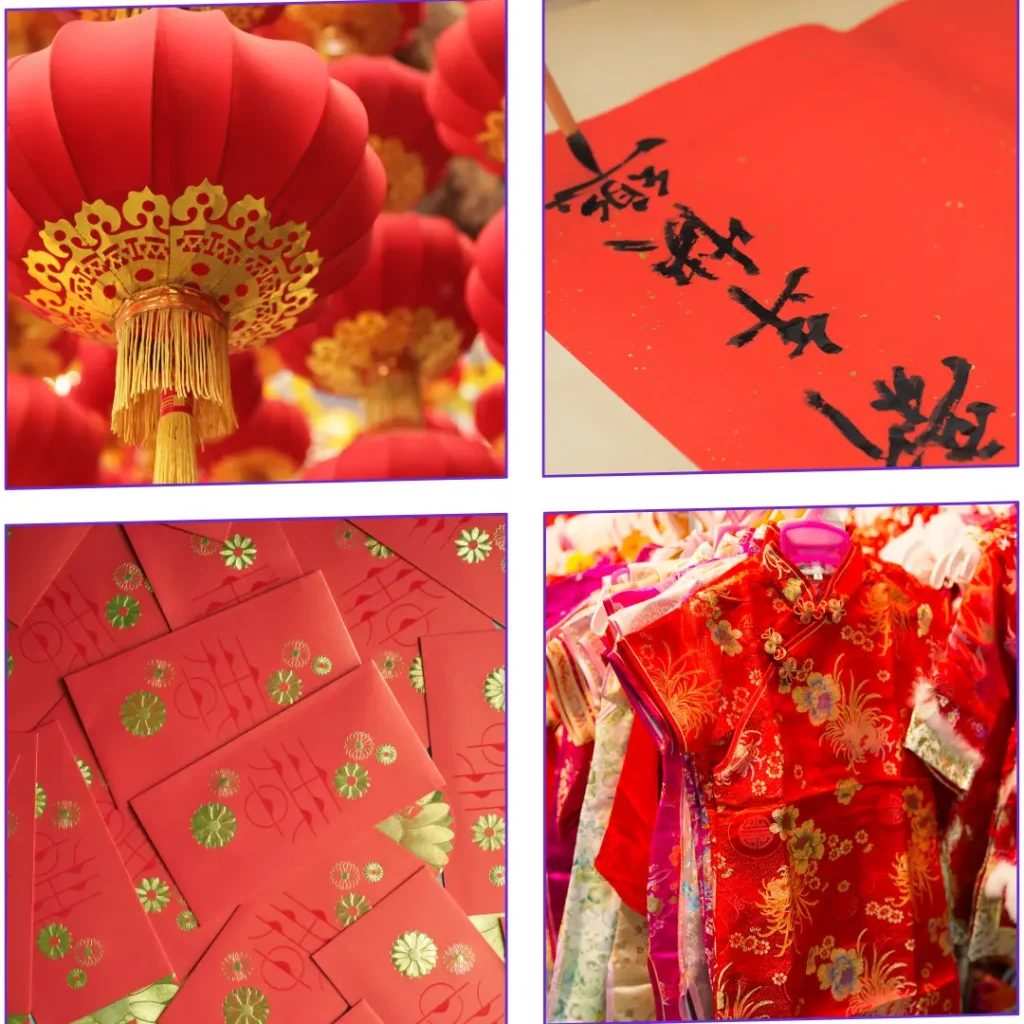
The Lunar New Year is packed with rituals to set the tone for a lucky year ahead. It’s not just about celebrations — it’s about carefully following customs that have been passed down for generations.
Clean Before — Not After — New Year’s Day: Homes must be cleaned before New Year’s Eve to sweep away any bad luck from the past year. But once the clock strikes midnight, sweeping or taking out the trash is a big no-no because it would mean sweeping away all the fresh good fortune.
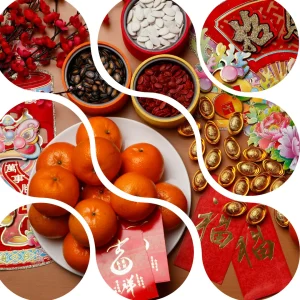
Eat Fish for Abundance: Fish (鱼, yú) sounds like “surplus” (余, yú) in Chinese, so serving a whole fish on New Year’s Eve is a must. To lock in the luck, it’s important to leave some fish uneaten — symbolizing that your blessings and wealth will overflow into the next year.
Hide Sharp Objects: Sharp objects like knives and scissors should be tucked away during the first few days of the New Year. Cutting is seen as cutting off good fortune, and no one wants to snip away their luck just as the year begins!
No Negative Words: Talking about death, ghosts, breaking things, or anything unlucky is avoided during New Year festivities. Even children are gently encouraged not to cry on the first day of the year because starting the year with tears is thought to bring sadness for the months ahead.
Wear Red and Gift Red Envelopes: Red is everywhere — from decorations to clothing — symbolizing joy, energy, and prosperity. Red envelopes (hongbao) filled with money are gifted to children and unmarried adults, carrying wishes for a year full of happiness and success.
All of these customs create a hopeful, lively atmosphere — and even if you don’t believe in luck, participating in these traditions feels like starting the year with a little extra positivity and charm.
Chinese Superstitions Around Pregnancy
Pregnancy is treated with extra care in Chinese culture because it’s seen as a delicate and spiritually sensitive time.
Some even say that pregnancy is one of the happiest periods in a woman’s life, not just because of the new life growing inside her, but because of the queen-like treatment she receives.
Especially in ancient royal families, if a woman became pregnant, she would be showered with special care, privileges, and attention, almost as if the future of the dynasty rested in her hands. This deep reverence still influences many traditional practices today.
Expecting mothers follow several important traditions to protect themselves and their babies.
No Baby Showers Before Birth: Celebrating a baby’s arrival too early is believed to tempt bad spirits or invite bad luck. Gifts and celebrations usually happen only after the baby is safely born.
In ancient times, it was also common for women not to announce their pregnancies early. People believed that revealing it too soon might attract bad spirits or cause the child to grow up “small-hearted” or weak. Keeping the news private for as long as possible was seen as a way to protect both mother and baby during those fragile early months.
Avoid Funeral Homes: Pregnant women are strongly advised to steer clear of funerals, mourning ceremonies, and even visiting homes where someone has recently passed away.
In Chinese belief, the yin energy associated with death is seen as especially harmful to the delicate life force of an unborn child.
Even in daily conversations, families encourage expecting mothers to avoid discussing anything related to death or bad luck during pregnancy.
This level of caution reflects the traditional mindset that protecting life starts not at birth, but from the earliest stages of existence. It’s not just superstition — it’s a deep cultural instinct to guard and cherish new life with every possible precaution.
Postpartum “Sitting Month” (Zuò Yuè Zi): After giving birth, new mothers traditionally stay indoors for a full month to recover. They avoid cold water, limit physical activity, stay warm, and eat nourishing foods like ginger chicken soup.
This month-long rest is thought to help restore balance and protect long-term health. Many Chinese women are often amazed to hear that in some Western cultures, new mothers return to work or resume normal activities just days after giving birth — something almost unimaginable within the Chinese tradition of careful postpartum recovery.
Choose an Auspicious Birth Date: In some families, especially in major cities, parents might schedule a C-section to ensure the baby is born on a lucky day according to the lunar calendar. They believe a well-chosen birth date can bless the child with a lifetime of good fortune.
Certain foods, like warming soups and specific fruits, are encouraged during pregnancy, while anything considered “cold” or overly spicy might be avoided. Everything — from activities to food choices — is guided by a desire to welcome the baby into the best possible circumstances.
Chinese Superstitions When Buying a House
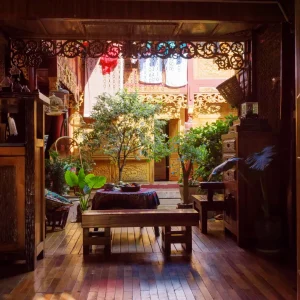
Buying a house in Chinese culture involves much more than just finding a good location or a spacious floor plan.
First, people carefully examine the house number — avoiding 4 if possible because of its similarity to the word for death, and favoring numbers like 8 and 6 for prosperity and smooth success.
The building’s history is another major factor: if a previous occupant experienced illness, death, or even bad financial luck, many buyers will walk away immediately, believing the negative energy could linger.
Feng Shui (风水) is also critical. A home with bad Feng Shui — such as a front door aligned directly with a back door (symbolizing fortune flowing straight out) — is usually avoided. Buyers often evaluate the layout to ensure the flow of qi (energy) is smooth and harmonious.
Some families even hire a professional Feng Shui master to inspect the home before signing any contracts, analyzing not just the house itself but also its orientation, surroundings, and the overall energy of the neighborhood.
This is especially true for people who plan to run a business out of their home or office. Entrepreneurs and business owners are often even more particular about Feng Shui because they believe a well-chosen property can greatly influence the future success, wealth, and stability of their ventures. In fact, many businesspeople will spend considerable time and money adjusting layouts, entrances, and even decor based on Feng Shui advice to ensure their work thrives.
In especially serious cases, buyers might consult both a Feng Shui expert and the Chinese lunar calendar to choose an auspicious date for finalizing the purchase or moving in. It’s seen as setting the foundation for a prosperous, harmonious future — and many are willing to invest time and money into getting it exactly right.
In traditional Feng Shui, homes at a T-junction — where a road points straight toward the front door — are considered highly unfavorable. It’s believed that strong, aggressive energy (known as 煞气, shà qì) rushes directly into the house, bringing accidents, misfortune, and financial instability. This “rushing qi” disrupts the home’s peaceful energy field, and many families would rather skip a house entirely than risk dealing with the unsettling consequences.
Another important feature to consider is the home’s orientation. A south-facing house is seen as ideal because it captures maximum sunlight throughout the day. In Feng Shui, sunlight symbolizes abundant yang energy — the kind that brings positivity, health, vitality, and prosperity. Homes that face south are thought to naturally draw in uplifting qi, creating a cheerful and harmonious living environment that supports both personal happiness and long-term success.
The layout inside the home matters just as much. One major Feng Shui red flag is having a staircase that faces directly toward the main entrance. Since the front door is called the “mouth of qi” — the point where all positive energy enters — a staircase lined up with it is thought to cause energy (and financial fortune) to rush right out the door. Instead of nurturing and growing inside the home, opportunities are believed to be lost just as quickly as they arrive. When people cannot change such a layout, some will use partitions, plants, or decorative screens to slow and redirect the flow of qi back into the living space.
Chinese Superstitions Around Death and Funerals
Death in Chinese culture is surrounded by a number of respectful and very specific taboos. Wearing white clothing is customary because white is the traditional color of mourning, symbolizing purity and the cycle of life and death.
During mourning, families will also cover mirrors in the home — it’s believed that mirrors can trap the soul of the deceased or allow spirits to appear, which could bring fear or bad fortune to the living.
Another important practice is to avoid participating in any festive celebrations such as weddings, housewarmings, or birthday parties while in a mourning period, out of respect for both the deceased and the living.
It’s considered extremely inappropriate to bring the “yin” (death) energy into events meant to celebrate “yang” (life and growth).
Mourning periods traditionally lasted up to 100 days, and in ancient times, especially among scholars and royal families, mourning for up to three years for the death of a parent was considered a sign of deep filial piety.
Today, while strict three-year mourning is rare, many families still honor a mourning period of 49 to 100 days. During this time, mourners often wear simple clothing, avoid attending weddings or celebrations, and show visible respect for their loved ones, keeping the spirit of traditional loyalty alive in modern ways.
Another widespread custom is burning paper offerings, known as “spirit money,” along with paper replicas of daily necessities like houses, cars, and clothing. This practice symbolizes sending material comforts to loved ones in the afterlife, ensuring they are well cared for even beyond this world.
On special days like the Qingming Festival (Tomb-Sweeping Day), it’s common to see families visiting ancestors’ graves and burning these offerings as a gesture of remembrance and respect.
Final Thoughts
Think Chinese superstitions are just old-fashioned beliefs? Think again!
These traditions are alive and well today, shaping how millions of people celebrate holidays, decorate their homes, and even make important life decisions.
They’re not about blind luck — they’re about hope, connection to heritage, and creating positive energy in everyday life.
Here’s why this matters to YOU:
- Now you’ll smile when you see red lanterns hanging everywhere during festivals, understanding they symbolize joy and prosperity.
- Planning to visit China during New Year? You’ll understand those upside-down “fu” characters everywhere.
- Even if you don’t believe in Chinese superstitions, respecting these traditions shows cultural awareness.
- Discover how the lucky number 8 (八, bā) sounds like “prosper” (发, fā) — perfect for remembering vocabulary through meaningful connections.
Want to keep the good vibes going? Share this with someone who loves cultural discoveries — you might inspire their next conversation or even trip to China (and who knows, maybe bring them some extra luck too)!
Bye for now, and stay tuned for more fascinating insights into Chinese culture — there’s so much more to explore together!
P.S. Which superstition fascinates you most? The lucky number 8? The upside-down “fu” character? Let me know in the comments!
